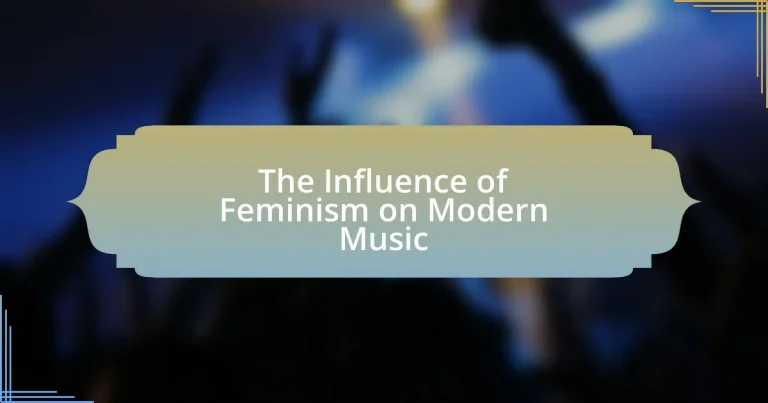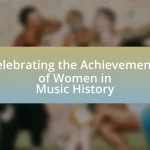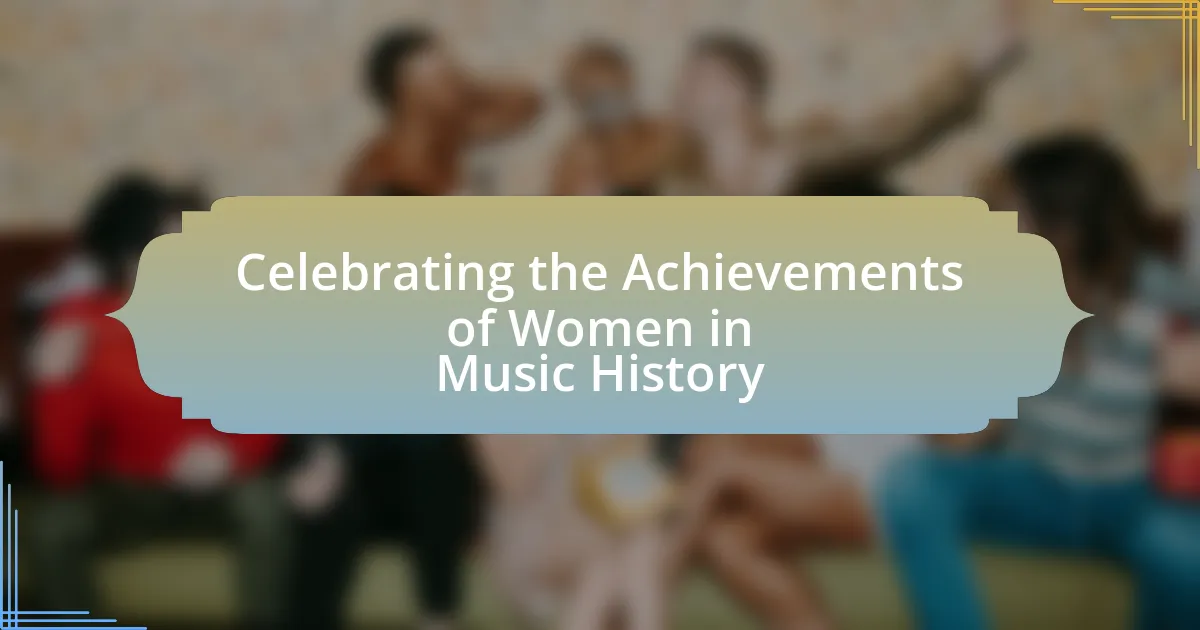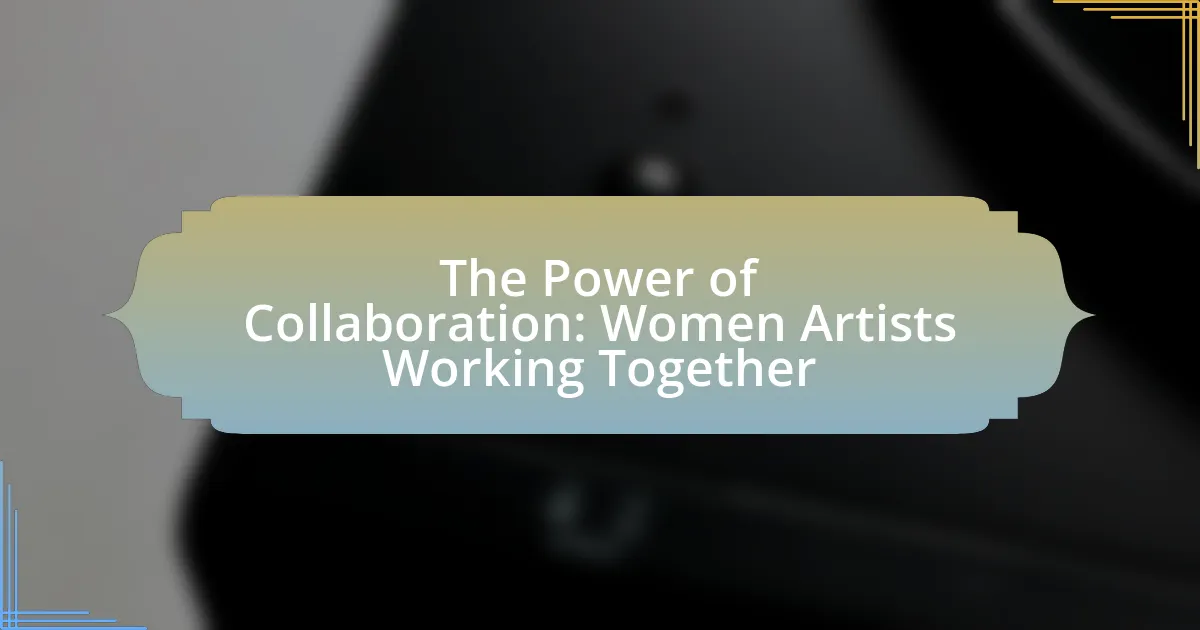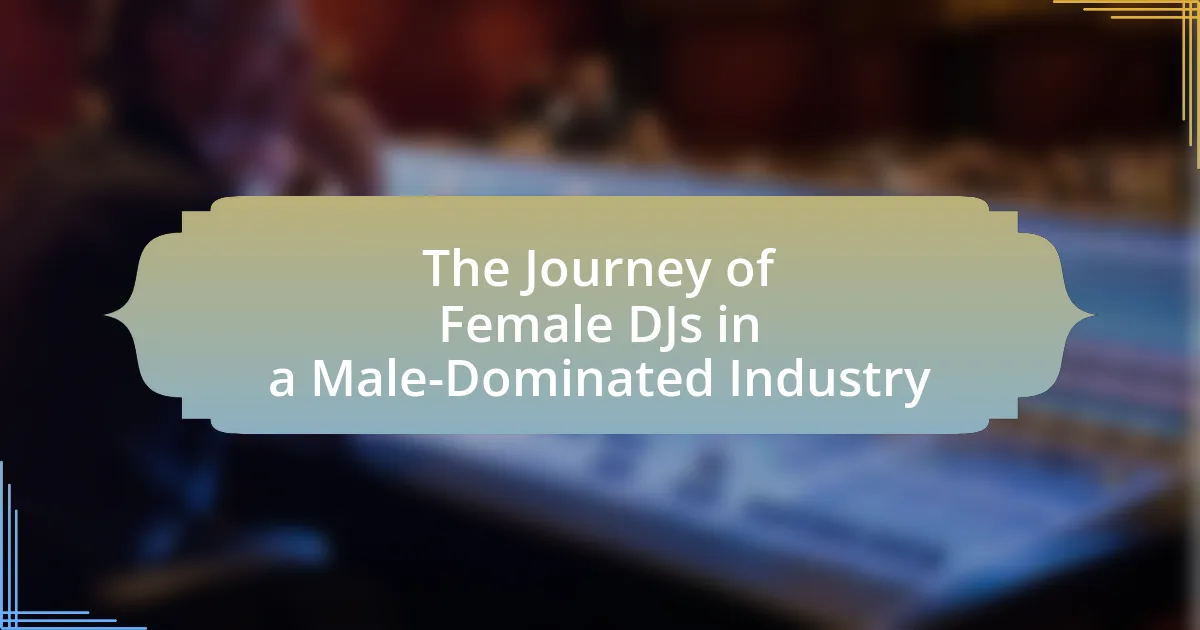The article examines the significant influence of feminism on modern music, highlighting how the movement has promoted gender equality and empowered female artists across various genres. It discusses the evolution of themes in contemporary music, such as empowerment and social justice, as reflected in the lyrics of artists like Beyoncé and Taylor Swift. The piece also addresses the historical impact of feminist movements, the challenges faced by women in the music industry, and the importance of representation in music production and distribution. Furthermore, it explores the role of technology and social media in amplifying feminist voices, as well as the future implications of feminism in reshaping the music landscape.
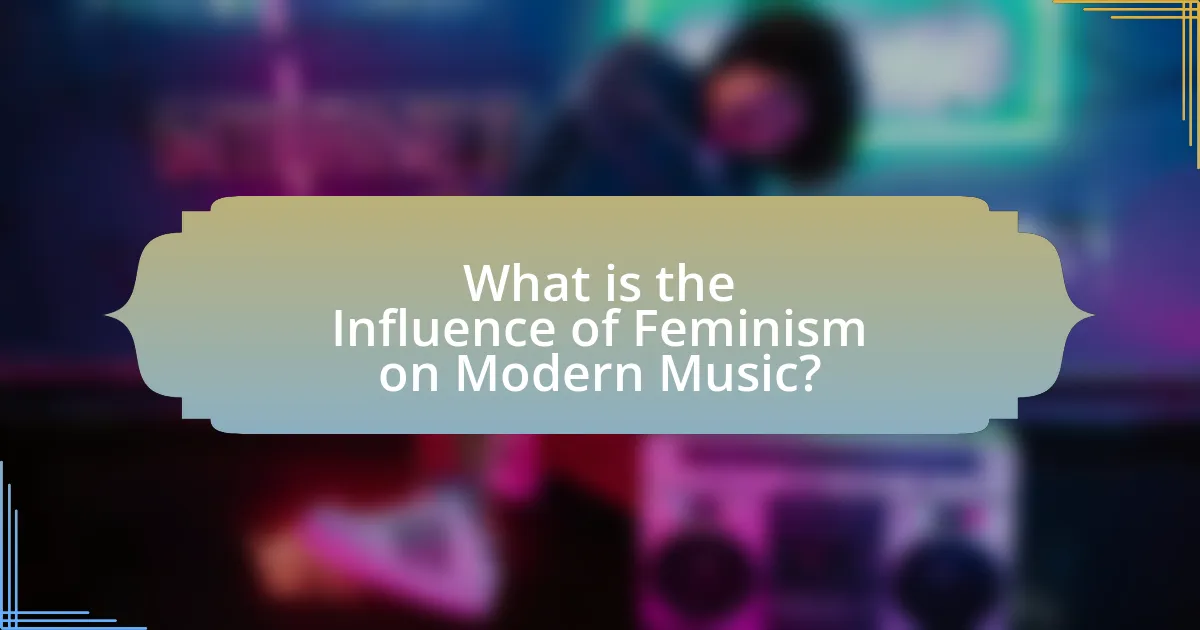
What is the Influence of Feminism on Modern Music?
Feminism has significantly influenced modern music by promoting gender equality and empowering female artists. This movement has led to a greater representation of women in various music genres, encouraging themes of female empowerment, autonomy, and social justice in lyrics. For instance, artists like Beyoncé and Taylor Swift have used their platforms to address issues such as sexism and body positivity, reflecting feminist ideals. Additionally, the rise of female-led genres, such as Riot Grrrl in the 1990s, showcased women’s voices and experiences, challenging the male-dominated music industry. The impact of feminism is evident in the increased visibility of women in music production, songwriting, and performance, reshaping the industry landscape and inspiring future generations of female musicians.
How has feminism shaped the themes in modern music?
Feminism has significantly shaped the themes in modern music by promoting messages of empowerment, equality, and social justice. Artists like Beyoncé and Taylor Swift have incorporated feminist ideals into their lyrics, addressing issues such as gender inequality and body positivity. For instance, Beyoncé’s song “Flawless” includes a sample from a TED Talk by Chimamanda Ngozi Adichie that emphasizes the importance of feminism, directly linking music to feminist discourse. Additionally, the rise of female-led genres, such as Riot Grrrl in the 1990s, challenged traditional gender roles and encouraged women to express their experiences and frustrations through music. This evolution reflects a broader cultural shift towards recognizing women’s voices and experiences, making feminism a central theme in contemporary music.
What specific feminist movements have impacted music genres?
The specific feminist movements that have impacted music genres include the Women’s Liberation Movement of the 1960s and 1970s, which advocated for gender equality and influenced artists like Joan Baez and Aretha Franklin, promoting themes of empowerment and social justice in their music. Additionally, the Riot Grrrl movement of the 1990s, characterized by its punk rock ethos, challenged sexism in the music industry and inspired bands like Bikini Kill and Sleater-Kinney to address feminist issues directly in their lyrics. These movements collectively reshaped the landscape of music by introducing feminist perspectives and encouraging female artists to assert their voices and experiences.
How do lyrics reflect feminist ideologies in contemporary songs?
Lyrics in contemporary songs reflect feminist ideologies by promoting themes of empowerment, equality, and challenging traditional gender roles. Artists like Beyoncé and Lizzo use their lyrics to advocate for women’s rights and self-acceptance, directly addressing issues such as body positivity and sexual autonomy. For instance, Beyoncé’s song “Run the World (Girls)” emphasizes female strength and independence, while Lizzo’s “Truth Hurts” celebrates self-love and resilience against societal pressures. These examples illustrate how contemporary music serves as a platform for feminist messages, encouraging listeners to embrace their identities and fight against systemic inequalities.
What role do female artists play in the feminist movement within music?
Female artists play a crucial role in the feminist movement within music by using their platforms to challenge gender norms and advocate for women’s rights. Through their lyrics, performances, and public personas, these artists address issues such as sexism, body positivity, and empowerment, thereby influencing societal perceptions of women. For instance, artists like Beyoncé and Lizzo have incorporated feminist themes into their music, promoting messages of self-acceptance and resilience. Additionally, the rise of female-led genres, such as Riot Grrrl in the 1990s, exemplifies how women in music have historically mobilized to confront patriarchal structures, creating a space for female voices and experiences. This ongoing contribution not only shapes the music industry but also inspires future generations to engage with feminist ideals.
Which female musicians are considered pioneers of feminist music?
Female musicians considered pioneers of feminist music include Joan Baez, who used her platform for social justice and women’s rights in the 1960s, and Judy Chicago, known for her contributions to feminist art and music. Additionally, artists like Ani DiFranco and Tori Amos have been influential in expressing feminist themes through their lyrics and activism. These musicians have shaped the feminist music movement by addressing issues such as gender inequality and empowerment, thus establishing a legacy that continues to inspire future generations.
How do collaborations among female artists promote feminist messages?
Collaborations among female artists promote feminist messages by amplifying diverse voices and experiences, creating a collective platform for advocacy. When female artists collaborate, they often address themes of empowerment, equality, and social justice, which resonate with feminist ideals. For instance, the collaboration between artists like Beyoncé and Shakira in “Beautiful Liar” showcases female solidarity and challenges traditional gender roles in the music industry. Additionally, projects like the “Women in Music” initiative highlight the importance of female representation and support within the industry, further reinforcing feminist messages. These collaborations not only foster a sense of community among women but also challenge patriarchal norms, making feminist themes more visible and impactful in popular culture.
Why is the representation of women in music important?
The representation of women in music is important because it promotes diversity, challenges stereotypes, and empowers future generations. Diverse representation allows for a broader range of experiences and perspectives in music, which enriches the art form and resonates with a wider audience. For instance, studies show that female artists often address themes of empowerment and social justice, contributing to cultural conversations. Furthermore, the presence of women in music can inspire young girls to pursue careers in the industry, as evidenced by initiatives like the Women’s Music Summit, which aims to support and elevate female musicians. This representation not only reflects societal changes but also drives progress toward gender equality in the music industry.
What statistics highlight the gender disparity in the music industry?
Women represent only 21% of artists in the music industry, highlighting a significant gender disparity. According to a 2021 report by the Annenberg Inclusion Initiative, this statistic reflects the underrepresentation of female artists across various genres. Additionally, only 12.3% of songwriters and 2.1% of producers are women, further emphasizing the lack of gender diversity in key creative roles. The disparity is particularly pronounced in popular music, where male artists dominate the charts, with women accounting for just 12% of the top 100 songs in 2020. These statistics underscore the ongoing challenges women face in achieving equality within the music industry.
How does representation affect the perception of women in music?
Representation significantly affects the perception of women in music by shaping societal attitudes and expectations. When women are portrayed in diverse roles—such as artists, producers, and instrumentalists—they challenge traditional stereotypes and broaden the understanding of women’s capabilities in the industry. For instance, the rise of female artists like Beyoncé and Taylor Swift has not only increased visibility but also empowered other women to pursue careers in music, as evidenced by the 2019 report from the Annenberg Inclusion Initiative, which highlighted that women comprised only 21.6% of artists on the Billboard Hot 100 from 2012 to 2019. This underrepresentation can lead to a narrow perception of women’s roles, reinforcing outdated norms. Conversely, positive representation fosters a more inclusive environment, encouraging both industry stakeholders and audiences to recognize and value women’s contributions to music.
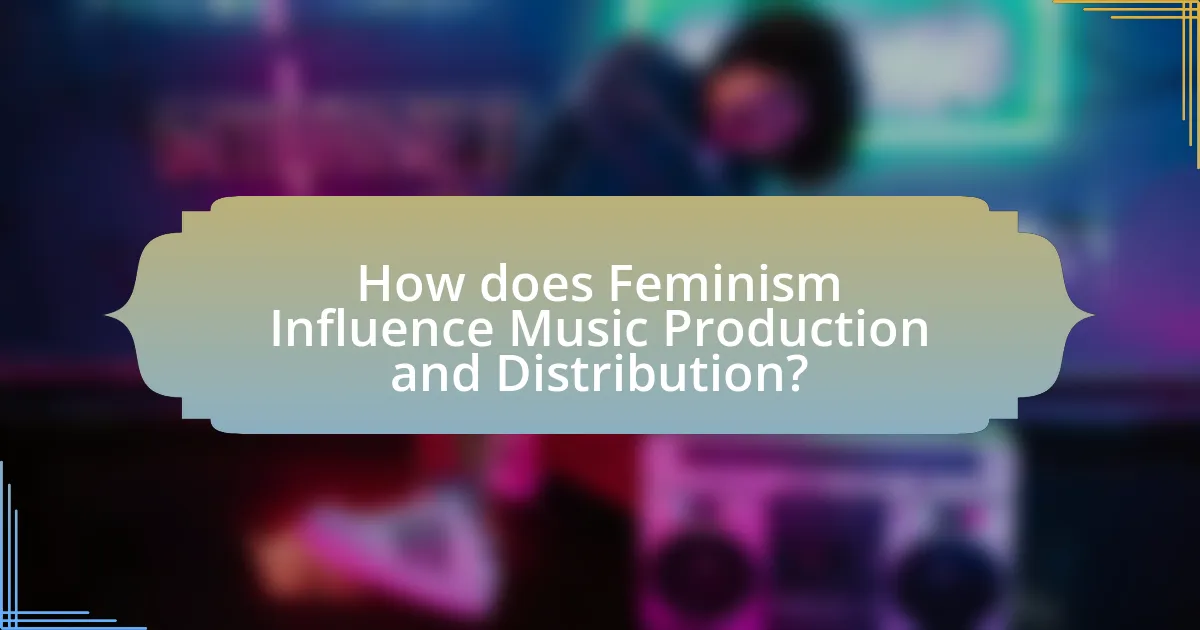
How does Feminism Influence Music Production and Distribution?
Feminism significantly influences music production and distribution by promoting gender equality and challenging traditional industry norms. This influence manifests through increased representation of women in various roles, such as producers, engineers, and executives, which has been documented in studies showing that female artists are more likely to collaborate with female producers, leading to diverse soundscapes and perspectives. For instance, the 2019 report by the Annenberg Inclusion Initiative revealed that only 2.1% of producers across the top 600 songs from 2012 to 2019 were women, highlighting the need for feminist advocacy to address this disparity. Additionally, feminist movements have led to the rise of independent labels and platforms that prioritize female artists, enabling them to bypass traditional gatekeeping mechanisms and reach wider audiences. This shift not only empowers women in the industry but also enriches the music landscape with varied narratives and experiences.
What changes have occurred in music production due to feminist influences?
Feminist influences have led to significant changes in music production, particularly in promoting gender equality and diversifying representation in the industry. Women have increasingly taken on roles as producers, engineers, and songwriters, challenging the male-dominated landscape. For instance, the rise of female producers like Linda Perry and Imogen Heap has demonstrated that women can excel in technical and creative aspects of music production. Additionally, feminist movements have encouraged the inclusion of diverse voices and narratives in music, resulting in a broader range of themes and styles that reflect women’s experiences. This shift is evidenced by the success of female-led projects and collaborations, which have gained critical acclaim and commercial success, thereby reshaping industry standards and expectations.
How do female producers contribute to the feminist narrative in music?
Female producers contribute to the feminist narrative in music by amplifying women’s voices and perspectives within the industry. They challenge traditional gender roles by taking on leadership positions in production, which historically have been male-dominated. For instance, producers like Linda Perry and Imogen Heap have not only created successful music but have also advocated for gender equality in the industry, influencing the representation of women in music. Research indicates that female producers often prioritize collaboration with female artists, fostering a supportive environment that encourages diverse storytelling and empowerment. This shift not only enriches the musical landscape but also promotes a broader cultural dialogue about women’s rights and representation in the arts.
What are the challenges faced by women in music production roles?
Women in music production roles face significant challenges, including gender bias, lack of representation, and limited access to resources. Gender bias manifests in the form of stereotypes that question women’s technical abilities and leadership skills, often leading to their exclusion from key decision-making processes. The lack of representation is evident, as women make up only about 2% of producers in the music industry, which perpetuates a cycle of underrepresentation and limits mentorship opportunities. Additionally, women often encounter barriers in accessing industry networks and funding, which are crucial for career advancement. These challenges are supported by studies, such as the 2020 report from the Annenberg Inclusion Initiative, which highlights the stark gender disparities in music production roles.
How has the distribution of music evolved with feminist perspectives?
The distribution of music has evolved significantly through feminist perspectives by promoting gender equality and amplifying women’s voices in the industry. Historically, the music industry has been male-dominated, but the feminist movement has challenged this status quo, leading to increased representation of female artists and the emergence of independent labels that prioritize women’s music. For instance, the establishment of organizations like the Women’s Audio Mission and initiatives such as the #MeToo movement have highlighted issues of sexism and harassment, prompting changes in how music is produced and distributed. Additionally, platforms like Bandcamp and SoundCloud have enabled female musicians to reach audiences directly, bypassing traditional gatekeepers. This shift has resulted in a more diverse music landscape, where feminist perspectives are not only represented but also celebrated, as seen in the rise of genres like Riot Grrrl and the increased visibility of women in various music genres.
What platforms support female artists and feminist music initiatives?
Platforms that support female artists and feminist music initiatives include Bandcamp, SoundCloud, and Spotify. Bandcamp allows female artists to sell their music directly to fans, often featuring initiatives like “Women in Music” to promote female creators. SoundCloud provides a space for emerging female artists to share their work and connect with audiences, while Spotify has curated playlists such as “Women of Rock” and “Women in Music” that highlight female talent. These platforms actively contribute to the visibility and promotion of female artists in the music industry.
How do social media and streaming services amplify feminist voices in music?
Social media and streaming services amplify feminist voices in music by providing platforms for artists to share their work directly with audiences, bypassing traditional gatekeepers. These platforms enable female musicians to reach wider audiences, engage with fans, and foster communities around feminist themes. For instance, artists like Billie Eilish and Lizzo have utilized social media to promote messages of body positivity and empowerment, gaining millions of followers and significant streaming numbers. According to a 2021 report by the Annenberg Inclusion Initiative, female artists accounted for only 21.6% of all artists on the Billboard Hot 100, highlighting the need for these platforms to elevate underrepresented voices. Streaming services also curate playlists that focus on women in music, further enhancing visibility and access to feminist content.
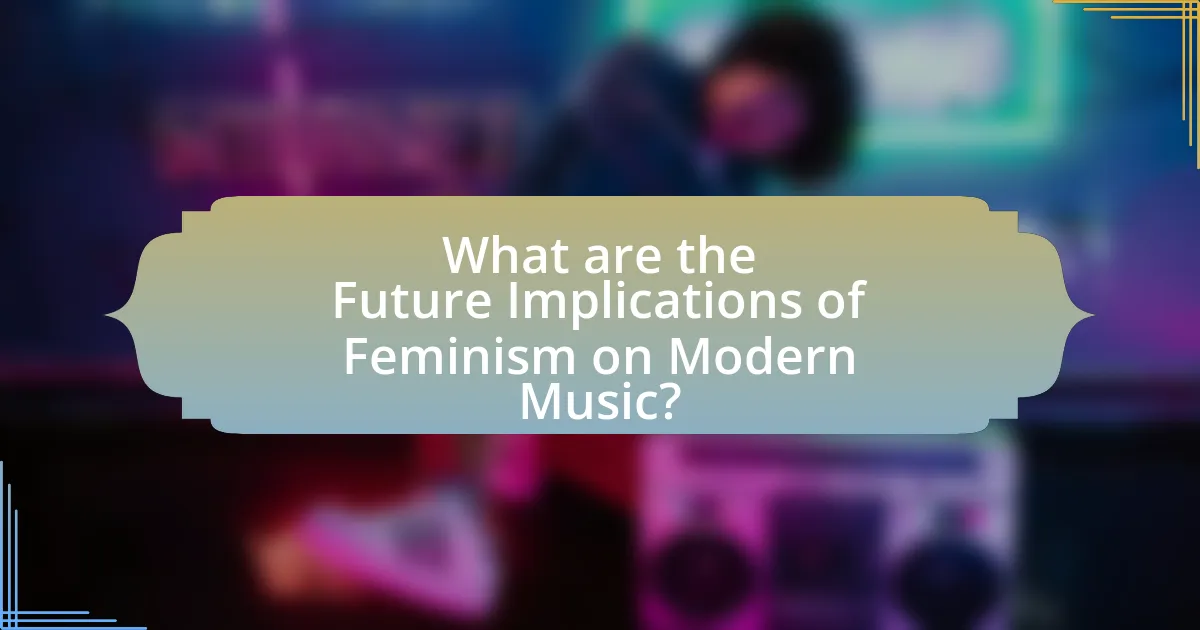
What are the Future Implications of Feminism on Modern Music?
The future implications of feminism on modern music will likely lead to increased representation and diversity in the industry. As feminist movements continue to advocate for gender equality, more female artists are expected to gain visibility and recognition, challenging traditional gender roles in music. For instance, the rise of female-led genres such as pop, hip-hop, and rock has already shown a shift towards inclusivity, with artists like Billie Eilish and Lizzo breaking barriers and addressing social issues through their work. This trend is supported by statistics indicating that female artists are increasingly dominating music charts, with women accounting for 40% of the Billboard Hot 100 in 2020, up from 20% in 2012. As feminism evolves, it will likely push for not only gender equality but also intersectionality, influencing lyrical content and the narratives presented in modern music.
How can emerging artists continue the feminist legacy in music?
Emerging artists can continue the feminist legacy in music by amplifying women’s voices and addressing gender inequality through their lyrics and public platforms. By creating music that challenges societal norms and promotes female empowerment, these artists can contribute to the ongoing discourse surrounding feminism in the industry. For instance, artists like Billie Eilish and Lizzo have successfully integrated themes of body positivity and self-acceptance into their work, resonating with audiences and inspiring change. Additionally, collaborating with female producers, songwriters, and musicians can further enhance representation and support within the music community, fostering an environment where women’s contributions are recognized and valued.
What strategies can new musicians adopt to promote feminist themes?
New musicians can promote feminist themes by incorporating gender equality messages into their lyrics and public statements. By writing songs that address issues such as women’s rights, body positivity, and gender discrimination, musicians can raise awareness and inspire change. For instance, artists like Billie Eilish and Lizzo have successfully used their platforms to discuss feminism, which has resonated with audiences and sparked conversations. Additionally, collaborating with feminist organizations and participating in events that support women’s causes can amplify their message and reach a broader audience. Research shows that music with strong feminist themes can influence listeners’ perceptions and attitudes towards gender equality, making it a powerful tool for advocacy.
How can collaborations across genres enhance feminist messages in music?
Collaborations across genres can enhance feminist messages in music by merging diverse perspectives and reaching broader audiences. When artists from different musical backgrounds unite, they create a rich tapestry of sound that can amplify feminist themes, making them more relatable and impactful. For instance, the collaboration between pop and hip-hop artists often results in songs that challenge gender norms and advocate for women’s rights, as seen in tracks like “WAP” by Cardi B and Megan Thee Stallion, which sparked widespread discussions about female empowerment and sexuality. This blending of genres not only diversifies the message but also attracts listeners who may not typically engage with feminist content, thereby expanding the reach and influence of feminist messages in contemporary music.
What are the potential challenges for feminism in the music industry moving forward?
The potential challenges for feminism in the music industry moving forward include systemic sexism, underrepresentation of female artists, and the commercialization of feminist messages. Systemic sexism persists in hiring practices, where women are often overlooked for key roles in production and management, limiting their influence in the industry. According to a 2021 report by the Annenberg Inclusion Initiative, women comprised only 21.6% of artists across the top 600 songs from 2012 to 2020, highlighting significant underrepresentation. Additionally, as feminist themes become more mainstream, there is a risk of commodification, where genuine feminist messages are diluted for profit, undermining the movement’s authenticity. These challenges indicate that while progress has been made, substantial barriers remain for feminism in the music industry.
How might societal changes impact the feminist movement in music?
Societal changes can significantly impact the feminist movement in music by altering the themes, representation, and visibility of female artists. For instance, the rise of social media has enabled women to share their experiences and music more widely, leading to increased awareness of gender issues in the industry. According to a 2020 report by the Annenberg Inclusion Initiative, women comprised only 21.6% of artists in popular music, highlighting the ongoing need for advocacy. As societal attitudes shift towards greater gender equality, the feminist movement in music may gain momentum, encouraging more female artists to challenge stereotypes and assert their voices. This dynamic interplay between societal changes and the feminist movement can reshape the music landscape, fostering a more inclusive environment for women in the industry.
What role will technology play in shaping feminist music in the future?
Technology will play a crucial role in shaping feminist music in the future by providing platforms for diverse voices and facilitating innovative music production. Digital tools such as social media, streaming services, and music production software empower female artists to reach wider audiences and collaborate globally, breaking traditional barriers in the music industry. For instance, platforms like Bandcamp and SoundCloud allow independent female musicians to distribute their work without the need for major label support, fostering a more inclusive music landscape. Additionally, advancements in music technology, such as AI-driven composition tools, enable artists to experiment with new sounds and styles, further enriching feminist music narratives.
What practical steps can listeners take to support feminist music?
Listeners can support feminist music by actively seeking out and promoting female artists and feminist-themed songs. This can be done by creating playlists that feature women musicians, attending concerts and events that highlight female performers, and sharing their music on social media platforms. Research indicates that female artists receive significantly less airplay and promotion compared to their male counterparts, with a 2020 study by the Annenberg Inclusion Initiative revealing that only 22.4% of artists on the Billboard Hot 100 were women. By amplifying the voices of female musicians, listeners can help to address this disparity and foster a more inclusive music industry.
